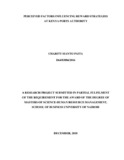| dc.description.abstract | The objective of the study was to establish the factors influencing reward strategies at Kenya Ports Authority. The study was anchored on 2 theories; Equity Theory as well as Reinforcement Theory. The factors considered for this study were market analysis, organizational culture and corporate strategies, performance management, trade unions, business performance and financial circumstances and government regulation and policies. The study used case study research design as this method is best suited for studies where an in-depth consideration of the phenomena is being sought. The target population was 350 members in the senior and the middle level management. The sample size was 30 percent of the targeted population leading to a sample size of 105. Data analysis was by use factor analysis, descriptive statistics and qualitative analysis. Presentation was by way of percentages, means and standard deviation. From the findings of this study, Kenya Ports Authority reward systems account for the periods that employees are willing to serve in the firm. That is to say, the better the reward system, the more the firm is able to retain top talent employees. The development, administration and management of rewards vary the organizational culture. The presence of trade unions in Kenya Ports Authority influences the reward strategies. This is because they are sanctioned to offer collective bargaining power for employees by ensuring that they fight for better working condition for the workers and bargain collectively for them. The existing government policies and regulations on the minimum wage have been implemented in Kenya Ports Authority ensuring that the government is able to influence rewards policies through the checks and balances. On performance management, the study recommends that the senior and the middle level managers should scrutinize its policies on dealing with poor performance to enforce them in order to limit others. The study recommends a focus on the financial as well as non-financial rewards and how they influence employee motivation in Kenya Ports Authority. The study was a perception study involving Kenya Ports Authority and thus a study will be required in future where the variables can be tested empirically and not based on perception. The researcher suggests that other studies be carried out in different organizations that deal with different products and services so as to obtain generalizable findings. | en_US |



